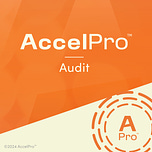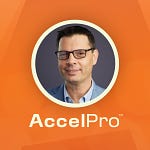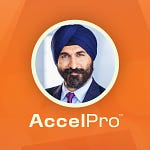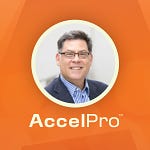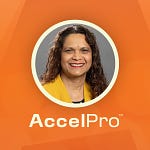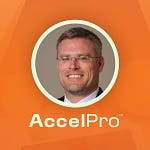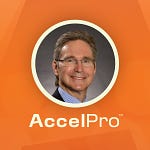Listen on Apple Podcasts, Spotify and YouTube.
Welcome to AccelPro Audit, where we provide expert interviews and coaching to accelerate your professional development. Today we’re featuring a conversation with Danielle Brannock, Manager of Data Analytics at Intuitive Surgical.
Brannock talks about the huge increase in efficiency which automation has brought to data analytics, liberating many professionals from rote tasks and allowing them to put their minds to creative problem-solving. Brannock says,
“What automation allows us to do is focus on strategic value adding work. It's going to free up your auditors to start looking at the outputs, making judgment calls, and then providing value to the business in a different way.”
Listen on Apple Podcasts, Spotify and YouTube.
Danielle Brannock‘s LinkedIn profile.
TRANSCRIPT
I. HOW AUTOMATED DATA CAN IMPROVE YOUR ORGANIZATION
Alizah Salario, Host: I want to start by talking about your role at Intuitive Surgical. You specialize in robotic surgical operations as an auditor, and you use data to help you track and analyze surgical performance. In other words, data is in your company’s DNA, and it's crucial to your process. Can you start with just a brief overview of how you approach organizing and analyzing data?
Danielle Brannock: Absolutely. We really focus on and we're centered completely around data. Everything from the procedures that our surgeons are performing using our robots, all the way to our finance department, of course, with the accounting information systems; it's all very data-centric.
And what's really fantastic about Intuitive is that within the finance and accounting organization, we really focus on making sure that all of our financial analysts and our accounting professionals have access to data analytics tools of their own. There's a huge push here, across the entire organization, to be data focused.
For my team in particular, we really look at data when we are trying to organize a project. We look at it as a business unit at a time. We're going to go out into the organization and we're really going to make our projects be focused around which part of the company we are looking at. For example, maybe we're doing work around the T&E space, or possibly the accounts payable space.
That's our first step, trying to scope down our data based on the accounting business processes that it's tied to. And from there, we have a list of all of our different contacts and people who we reach out to, to actually obtain access to data if we don't already have it.
But high level, the first thing we do on any project is identify the area of the business. What kind of data sources do they already have, and how can we leverage the work that those teams are already doing with data to get us a jumpstart on our projects?
AS: You bring up an interesting point about using data to help extract business insights. Can you talk us through an example of how data gives your team deeper insights into existing and emerging risks?
DB: Yeah, of course. Just to give a little background, I am leading a dedicated audit analytics team, and the whole group that I am running, we are all full time data analysts. We are spending every day, 100% of our time, working on data. Projects that we work on tend to focus around continuous monitoring for the organization, and so we're really going out and looking for risks around policy violations, internal control weaknesses, or even fraud red flags.
A good example of this would be, we have a project we just finished around T&E where we went out and we partnered with the leaders of our T&E part of the organization. And with any project, our team always starts off saying, “How can we make your lives easier?” We don't want to come in as those auditors who are pushing down what we want you to do.
We try to come in and partner with our business stakeholders, understand what their pain points are, and then embed ways that could help their lives be easier into the work that we were already planning.
What we did with our T&E partners is we built out a suite of dashboards and some analytics around fraud red flags within T&E. They flag policy violations for all of our spend when our employees are traveling. And every quarter we work with that department to provide them insights into what has happened and what might be happening. It gives them a more granular view into their own part of the organization.
On their team they might have some tools they can use, but by partnering with us, we're able to really build out more robust analytics for them. We almost function as a COE at times as well, partnering with the business.
–
II. DATA AUTOMATION: IMPROVING PERSONAL AND PROJECT EFFICIENCY
AS: That's really interesting because data analysts like yourself often have a reputation for being focused on number crunching, being very in the weeds, and I imagine that's particularly true in audit. But you've just spoken to how automation is really accelerating and improving the process for you and your team. Can you tell us a little bit more about a project where automation really helped you find the right solution?
DB: We are just finishing this project right now; it is one of my pet projects. I'm so excited about this one. As part of our group within internal audit, we are responsible for filing a regulatory process. We work in healthcare, and so we are covered by a particular regulation called the Sunshine Act.
According to this act, we have to give transparency on any payments that we have made to a doctor, or any kind of covered healthcare professional. It can be certain types of nurses as well. And this is to provide transparency to the public to ensure that they're able to see if your doctor has received payments from Intuitive. We don't want people to think that we're bribing doctors into using our robots, of course. And so this is all about transparency and providing safety to the public.
On our side, we were manually collecting data sources from across the organization. There was one individual on our team who, this was basically her full time job, and she would go through all this data and look for missing data points. We would have various fields—maybe the missing data came from our T&E system, and someone typed in the wrong physician's name, or maybe it came from our general ledger, and the vendor master file isn't completely up to date. She was going through manually and making all of these changes.
What we found out is she was using a number of different systems to look these people up. If she wanted to figure out who Dr. John Smith was, she was logging into our Salesforce, logging into a national government run website that has a registry of all of these doctors, and she's searching for people by names, scrolling down the screen and trying to find the one who she believes is the correct doctor.
And we've been able to give about 80 percent or so automation to this entire process now. We've tapped into all of those data sources on the backend, including external websites through APIs. And we're able to generate for her a fuzzy matched output that says, “This John Smith in our data set could be one of these five people.”
And we give her a score of the likelihood of whether or not it's a particular person. She's looking at that output in an Excel file from us, and no longer having to log in to all of those other different data sources. She puts a mark next to the individual who's the correct doctor, and our system ingests that file and then automatically updates all of that back end data for her so that at the end of the year, we can report out on the correct doctors.
Originally, this was taking her about 40 hours a month, and we've brought her down to about 40 hours a quarter, so we've cut her time in about a third here. It freed her up to do a lot more strategic work and to support others on the audit team doing actual operational audits and SOX activities instead of just spending a lot of her time doing this kind of manual data entry process.
AS: Let's talk about the future now because if there's one constant, it's change. And because you value such an innovative approach, I want to know more about how you socialize and share changes, particularly when you face resistance either among people you're working with on your team or outside organizations that you're partnering with.
DB: My personal brand is very much, how can I make someone else's life easier? I approach most of my projects from more of a system development perspective.
One of the things that I'm most fond of in my workspace is that a lot of what I'm doing is building full systems. It's like a systems development project. Let's say we're building something new that's going to support the manual journal entry review process during our month end close. If we're building a dashboard to support that, and I'm trying to generate buy-in from the business, I really focus on how to build that relationship up front to create a sense of trust between me and my stakeholders.
I take them on the journey with me; I want them to be invested. The most successful audit analytics, if you are trying to support the business, is to have them on the journey with you, invested up front and excited about whatever it is that you're building for them.
AS: Take us on this journey with you and tell us about implementing an end to end solution from beginning to end and how it exemplifies your comprehensive approach.
DB: I'll use an example of continuous monitoring for an end to end solution. We look at everything at a high level at first. We start out looking at the business risks: assessing what are their current processes, where we could have internal control weaknesses, policy violations, etc. Our team will generally come up with a suite of tests that we want to run.
Let's use manual journal entries as our example. I went out a couple of years ago; we started this project with a list of what our team wanted to do. We wanted to test for 15 different potential fraud or policy violations within the manual journal entries population. We come in and we meet with the stakeholder with that in mind. We kick it off with the business, talk about what our team would like to do, but then it turns into more of an interview where we hear what their pain points are and discover what we could do to support them while we're already here.
We learned a lot around the month-end close process at our organization, and ended up actually building out a whole separate suite of dashboards to support month-end close review at the same time we were doing our own fraud and policy analytics. From there, we start designing what the system is going to look like.
And I am all about repeatability. For every one of our continuous monitoring projects, we use the exact same approach from a technical perspective. We have a set of scripts that model the data, and those are going to be very different from project to project, just based on the data source being unique for each part of the business.
From there, we push the data through, and we put it through all of the different tests and the different analytics that we're trying to run. Everything comes back via a very large series of joins. We have the original data, it's still the same, and now we've just added a lot of columns off to the side, indicating whether transactions did or didn't fail various tests.
The idea is to be as hands off as possible. And again, I look at it from a system perspective. How do we make sure that everything can run smoothly? We focus on, if we need to make changes, what's the minimal impact we can have? Are we building our code to be robust and to have a very universal view so that we can make small updates here and there based on the data sources?
AS: Danielle, you just talked us through an incredible example of automation, and I have to play devil's advocate and ask you about the downside of this. A lot of auditors are towing a tricky line right now when it comes to tech. You're using new tools that make your job easier and more efficient. However, there's some fear that these tools might replace certain roles entirely, especially if there's a lot of repetition or mundane tasks. How can auditors stay relevant as a lot of their process becomes automated?
DB: I firmly believe that we are not going to be replaced. What automation allows us to do is focus on strategic value adding work. Thinking of an auditor on a team that has no automation and no analytics, they are likely pulling up PDFs, manually looking for things such as contract dates or invoice signatures. They're opening Excel files and maybe applying manual pivot tables or formulas on a regular basis. It's very tedious. At the end of the day, a lot of the work that a more junior accounting specialist or auditor is doing is going to be mundane, rote, boring.
What automation lets us do is take all of those repeatable tasks and have a computer do it. That could be using robotic process automation through something like Blue Prism, or analytic process automation, which is what I do, which is more about data analytics being automated.
It's going to free up your auditors to start looking at the outputs, making judgment calls, and then providing value to the business in a different way. And I think auditors have a very unique perspective for those types of activities. I love the idea of internal auditors being trusted advisors because we see the whole business. From end to end we're able to holistically view what's happening across the organization.
AS: I want our AccelPro audience to know that you've also written a book called Accounting Information Systems, Connecting Careers, Systems, and Analytics for Students. And the book is all about how analytics and information systems can facilitate operations. Tell us why you felt this is such an important topic to cover.
DB: This project was a very unique one. I'm not a PhD, so the book is actually a textbook. It is used in undergraduate or graduate programs for the accounting information systems course, which is generally considered a required class to take within the U. S. if you're pursuing an accounting degree.
I got looped into this project because the lead author, Dr. Arlene Savage, was one of my professors during my undergraduate at the University of Alabama at Birmingham. I think that we have a lot of books in the accounting academic space that are very focused on what I can only call academia. And accounting information systems, from my perspective, is the backbone of any accounting education. Many would say it's journal entries—that would be your financial accounting—and that is essential, but at the end of the day, a career in accounting is so much more than just bookkeeping.
You have options of going on to work across the board, from tax and audit to bookkeeping. You can be involved in pricing, commissions; you can be a financial analyst; you can even be someone like me who's working in data analytics, or someone working in cyber security.
And accounting information systems as a topic is that backbone of a company. It’s where all of that accounting data flows from the very beginning of acquiring materials all the way out to where we're making sales and we are reporting our revenue. I was passionate about making this an approachable and attainable topic for students, especially for the younger generations coming up.
AS: In addition to being more accessible and conversational, the book also really aims to emphasize diversity and inclusion. As I was looking at it online I noticed that it made an effort to make learners feel seen. Why was that so important to you?
DB: It's so important to me because I am part of diversity inclusion. I am queer-identifying, and so for me it was so essential that we represented things even as simple as gender neutral pronouns. I remember writing the book and making a point that every chapter needed to have at least X percentage of the examples using a gender neutral pronoun in it.
The diversity and inclusion aspect was a very exciting part for me—to be able to influence the accounting academic space in that way.
–
III. FINDING YOUR WAY TO INTERNAL AUDIT
AS: That's amazing. I want to talk about your career path. You began your career in external audit at PWC and then EY, and then you moved on to internal audit analytics at larger companies in the Atlanta area. Tell us a little bit about how you ended up moving into internal audit with such a strong focus on data-driven analysis.
DB: Absolutely. My journey has been less than linear. It's definitely bounced all over a little bit. I graduated with my accounting degree and I was sitting for my CPA. I had never written a line of code before PwC made an offer to me. They had me join their dedicated data analytics team as a full time analyst. I spent those first couple of weeks at PwC doing a lot of crying at home over some code, wondering if I'd made bad life decisions. And it took a few months to get my feet under me and decide that this was the right path.
And so I did. I spent a couple of years at the Big Four. I have experienced, like you said, both PwC and EY, and was a single mother at that time. It was very challenging to be in the Big Four environment while also raising a child. She was in first grade when I first started at PwC, so raising an elementary school aged child alone was very complicated; it's long hours; it's a lot of office time.
The reason I left PwC for EY was because EY offered me a fully remote position and it completely changed everything. This would have been back pre-pandemic when that was not the normal state by any means. I ended up leaving EY because I found that my passion was detrimental to my health.
I ended up with my now husband and we moved in together and he was observing the number of hours I was working a day. It is amazing when you work from home and you love what you do, how you can just put your head down and lose time. I was working incredibly long hours and I would be online after dinner, late at night, working on code even if it wasn't mandatory, because I would just be trying to solve the problem, and trying to get to the root of whatever was happening.
We decided that I was going to leave the Big Four for some work life balance. I went to a company here in Atlanta where I became a lead technical data analyst for a DevOps team.
It was completely different, nothing to do with the accounting space at all. And I only lasted less than a year. I found out very quickly that I missed accounting and I missed working with financial numbers and looking for fraud.
That's how I ended up in internal audit. From there I was recruited over to Westrock by a colleague who had been reaching out to me for some time about joining his team and I finally told him, “I'm ready. I'll come join your team.” It was incredible to me, though, when I joined the internal audit department that I knew nothing about internal audit, even after all those years of external audit. It's just a completely different view of the organization.
I had to spend quite a while ramping up on a lot of the accounting information systems knowledge, understanding the business processes and how they were interrelated. But I was able to do analytics full time there and loved it. And I've been in internal audit analytics ever since; I have no plans of leaving. I'm a manager here at Intuitive, and if you ask me what my five year plan is, my five year plan is to grow my current program and to expand my team headcount and build out a strong program here at my current company.
AS: It sounds like you're both a manager and a mentor and clearly, as a speaker and a writer, you inspire others. But because we are a peer to peer network, I want to know who you turn to for support when you're faced with a challenge or professional crisis.
DB: It's such a good question. I don't have a lot of peers or mentors myself in my own space. In fact, in my journey as an internal audit analyst, up until this current team, I was generally the only person in the audit department who was doing data analytics. I would be alone on an island doing all the analysis myself. There wasn't a lot of opportunity as I was progressing in my career for me to really connect with other mentors in my space.
Back in 2021, my boss was brought in to take over. He became the head of internal audit, so he took over the internal audit department and he has hired a lot of individuals since then. My boss's passion and his mission is to have a data focused internal audit department. He has previous experience himself leading an audit analytics function.
Additionally, we have someone on my team who leads the other half of audit, so he's my peer. He leads all of our business audit team members, and he is previously the head of an audit analytics department. If you look at our internal audit department, we have the head of audit, the head of business audit, and the head of analytics, and all three of us have many years of experience in audit data analytics.
These days, if I have a technical problem and I'm looking for someone to help me with a challenge or a crisis, I'm going directly to my boss or to my counterpart, because between the three of us, it's very rare that we can't whiteboard out an issue.
AS: I want to end by asking you a big question about the future. You've said that your career focus is simply to find a better way. What do you mean by that?
DB: It is my focus. I literally have it on a board in my office at home that shows up on a lot of my conference calls. I've had that as my personal motto for over five years. What I really mean by that is, how do we look at the way that we're doing things on a daily basis and find a way to free up our time to do those more strategic value adding activities?
Maybe it is automation, or eliminating a process entirely if it's redundant or unnecessary. Sometimes it can be as simple as, how can I help you put an Excel macro in place to automate something simple? But every tiny bit that we're able to move the needle towards removing those really rote and mundane tasks helps us—as auditors, finance professionals, and accounting professionals—all be placed into a more strategic position, no matter what our job level is and no matter what our experience is.
Listen on Apple Podcasts, Spotify and YouTube.
This AccelPro audio transcript has been edited and organized for clarity. This interview was recorded on November 15, 2023.
AccelPro’s expert interviews and coaching accelerate your professional development. Our mission is to improve your day-to-day job performance and make your career goals achievable.
Send your comments and career questions to questions@joinaccelpro.com. You can also call us at 614-642-2235.
If your colleagues in any sector of the audit field might be interested, please let them know about AccelPro. As our community grows, it grows more useful for its members.



